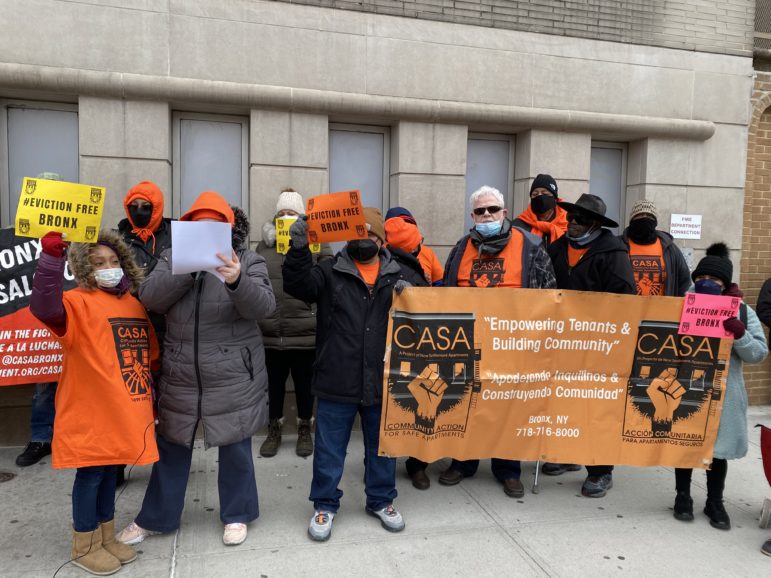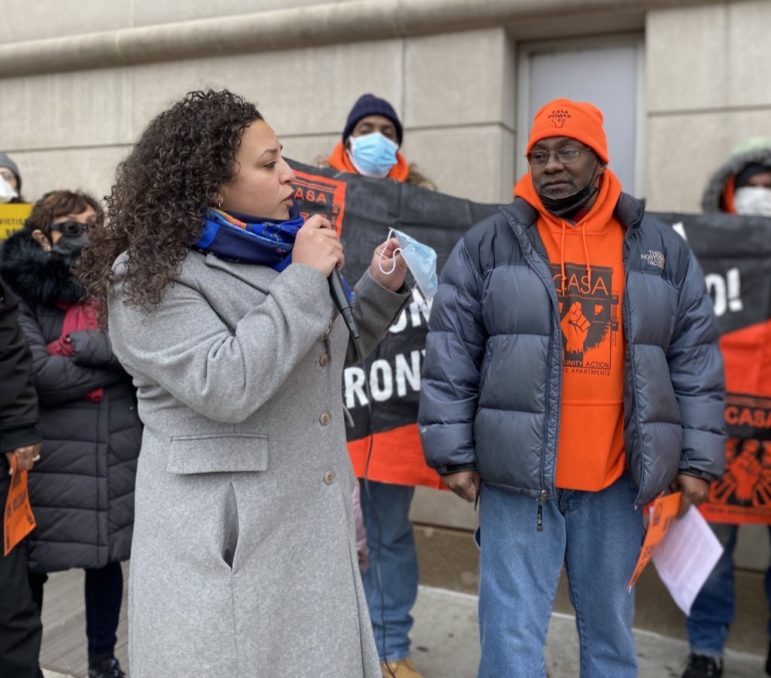“Our goal is to intervene and disrupt the eviction process,” one organizer said at a rally outside Bronx Housing Court Thursday. “We’ve always known the eviction moratorium is a temporary measure [but] it made it possible for our members to dream of a world without evictions.”

David Brand
Tenant organizers rallied outside Bronx Housing Court on Feb. 24, 2022, calling for an end to evictions.A Bronx-based tenants rights group says members are ready to put their bodies on the line to stop evictions, as cases mount in a borough with more tenants removed from their homes in recent years than anywhere else in the state.
Community Action for Safe Apartments (CASA) plans to engage in “eviction blockades” modeled off recent demonstrations against an alleged deed theft and illegal eviction in Crown Heights, members said Thursday. CASA Director Pablo Estupiñan said “civil disobedience”—protests at the courthouse and even physically blocking marshals from executing evictions—would be one pillar of the organization’s new Eviction Defense Network.
The group, a division of the organization New Settlement, is also recruiting volunteers to visit Bronx residents who received eviction notices and inform them of their right to an attorney and their ability to stay in their apartments until a judge orders them out.
“Our goal is to intervene and disrupt the eviction process,” Estupiñan said at a rally outside Bronx Housing Court. “We’ve always known the eviction moratorium is a temporary measure [but] it made it possible for our members to dream of a world without evictions.”
He said the organization has been consulting with other tenants’ rights groups across the city, including Brooklyn Eviction Defense, which occupied a Crown Heights stoop to prevent marshals from evicting a family who accused the property owner of stealing their deed. The protest garnered significant attention and was joined by elected officials like Attorney General Letitia James and State Sen. Jabari Brisport. Activists have engaged in similar actions in residential communities, including Maspeth and elsewhere in Crown Heights, during the COVID crisis.
“The pandemic helped radicalize people and made it really clear who has the power,” Estupiñan said. “The Bronx has been the epicenter of the eviction crisis.”
One of every 79 households in the Bronx were evicted from their apartments in 2018, according to a City Council-commissioned report. That was more than double the rate of evictions in Brooklyn, where one of ever 180 renters lost their homes that year.
The number of executed evictions decreased drastically over the past three years, from nearly 17,000 in New York City in 2019 to just over 2,500 in 2020—all but a handful before a mid-March moratorium took effect that year—and around 220 last year. Significantly more evictions have been filed in court but not actually carried out yet: New York City saw 44,982 eviction filings last year and 78,286 in 2020, down from 179,598 before the pandemic in 2019, state data shows. In many cases, tenants and landlords reach a settlement outside of court or the renter leaves before marshals actually execute the eviction.
Since the start of 2022, property owners have filed for 8,922 evictions citywide as of Feb. 18. Brooklyn accounts for more eviction filings than any other borough so far this year, according to a zip code-level tracker on the state court system website. Landlords commenced 2,142 eviction cases in Brooklyn Housing Court between Jan. 1 and Feb. 18. There were 948 eviction filings in Bronx Housing Court during that time period on top of nearly 4,000 last year, the data shows. Those numbers do not include a raft of non-renewals, including notices received by tenants leasing co-op units purchased by a private equity firm last year.
CASA’s confrontational tactics are not likely to sit well with property owners.
“If a judge has made a determination and someone is being evicted at this stage of the game, they’re being evicted for good reason,” said Valentina Gojcaj, a Bronx property manager and member of the organization Small Property Owners of New York. “You don’t just walk into housing court and get someone evicted.”
Gojcaj said tenants should seek rental assistance from the city or state and reach settlements with their landlords rather than engage in “theatrics.”
“The only reason they’re in court is because we need money to pay our bills,” she added.
A statewide freeze on most evictions expired Jan. 15, though a feared wave of tenant removals has not yet crested amid lengthy court processes, settlements and repayment through New York’s Emergency Rental Assistance Program. The number of people staying in New York City’s shelter system has remained virtually unchanged since the start of 2022, according to daily data tracked by City Limits.
READ MORE: Tracking the Number of People in NYC Homeless Shelters in 2022
Bronx tenant activists have also urged the city to raise the income threshold for tenants at-risk of eviction to qualify for free legal counsel throughout the process. To qualify for full representation, households must earn less than 200 percent of the federal poverty line ($25,760 for a single person, and $53,000 for a family of four). A bill to raise the eligibility threshold to 400 percent of the federal poverty line stalled in the City Council last year. Some councilmembers have called for a universal right to an attorney in Housing Court regardless of income.
Bronx Assemblymember Latoya Joyner introduced legislation last year to establish a statewide right-to-counsel. The bill has 29 co-sponsors, including fellow Bronx Assemblymember Nathalia Fernandez, who spoke at the rally Thursday.

David Brand
Bronx Assemblymember Nathalia Fernandez at the rally outside Bronx Housing Court.“The right to counsel was a game-changer in New York City,” Fernandez said. “You have a real chance at keeping your home.”
Nearly 85 percent of households represented by an attorney in Housing Court were able to remain in their homes in 2020, according to a report published last year by New York City’s Human Resources Administration.
But many tenants do not realize they qualify for free legal representation, especially if they do not speak English, said CASA leader and Right to Counsel Coalition Steering Committee member Randy Dillard.
“The landlord is telling them they can get rid of them, but they don’t know they have these rights,” Dillard said.










2 thoughts on “Bronx Tenant Group Considers ‘Eviction Blockades’ as Court Filings Mount”
This has become a trajectory of abuse of these landlords taking advantage of poor people or people underrepresented and if you have no representation more than likely you will lose your home, we need to help those in need SUPPORT the tenets and let’s put up a fight Stop the ABUSE…..
I feel bad for those being evicted but the NYS moratorium will be shown to have been unconstitutional. The moratorium was illegal because it forced landlords to provide free housing in their own private property. That is an unconstitutional taking of private property. Good Cause Eviction will also be found unconstitutional for the same reason.